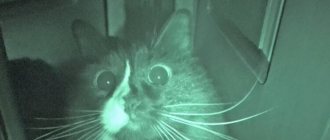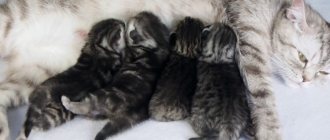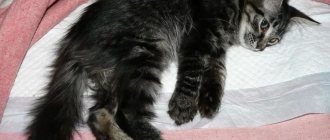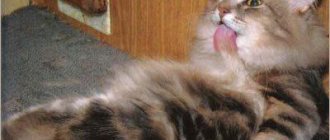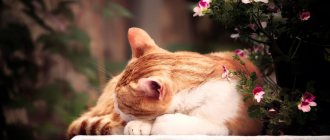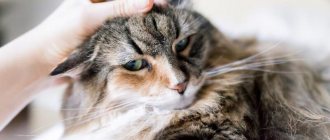Many cat owners have probably watched their pet bury food in her bowl more than once. This picture looks very funny, but not every owner thinks so - for some, this behavior of the pet seems abnormal. It is especially strange to see how an animal hides leftover food in the most secluded corners of the apartment.
There are at least two main reasons why cats bury food: innate instincts or acquired habits.
Saving food for later
A cat buries a bowl of food because that’s what its relatives did many years ago. This behavior is due to the desire to preserve supplies for the future. Outside the house, animals get their own food - for this they have to hunt, but not every hunt ends fruitfully. To avoid starvation, animals save food by burying it.
It is difficult to fight the instinct, and if the owners do not find other reasons for burying, they leave everything as it is.
Cleanliness
People throw away spoiled food. And cats bury. For what? Animals are very sensitive to unpleasant odors. That is why they try to bury their feces.
Particularly whimsical furry beauties can demonstrate in this way that they disdain leftovers. Even if the food sits in the air for less than an hour. In this case, you can suggest feeding the animal in small portions and immediately removing any leftover food so that it does not turn sour. But not everyone can devote so much time to their pet. Therefore, a good solution may be machines for serving portioned food or dry food itself, as a snack option in your absence. Also, make sure that your cat only buries certain foods; she doesn’t like a particular smell.
Unpleasant smell of stale food
You can easily notice that cats love cleanliness. They are unlikely to eat food that they do not like. Therefore, if the pet sniffed the bowl and began to bury it, we can talk about the poor quality of the food or its spoilage. The cat does not have the opportunity to throw away its food, so there is nothing left to do but bury it deeper.
Particularly capricious cats bury food that has been left in the air for only 2-3 hours. It is fundamentally important for such animals that they are given only fresh food - the owners may have to feed the shrew several times a day and little by little.
The food smells strong, you need to bury it so that other predators don’t come!
The wild ancestors of modern domestic cats were forced to obtain their own food. They existed in conditions of fierce competition, and in order to preserve their hard-earned food, they had to hide it in safe places that their relatives and other predatory fauna could not reach.
Some of their domesticated descendants have retained this skill, and even when well fed, they continue to bury food: after eating, they scratch the floor next to the bowl with their claws.
Cats usually bury food with a distinct odor, which, in their opinion, can attract predators eager for other people's supplies.
Competition with other animals
One of the reasons why cats may bury food is due to competition with other cats or dogs that share their territory.
In this case, there are two options why the cat buries a bowl of food:
- This can happen if the cat does not live at home alone, that is, several cats or other pets live in one apartment. The instinct of competition awakens in the animal, and it buries a bowl of leftover food so that others do not encroach on its food.
- The reason may be feeding the cat outside (for example, if the owners live in a private house and prefer to place the bowl of food outside the house). In this case, the cat senses that there may be other cats nearby, and instinctively buries the leftover food so that its smell does not attract strangers.
It is worth setting the number of bowls according to the number of “heads”. In some cases, it will be necessary to delineate the place for food - if serious battles break out because of it.
Habit
In addition to instincts, a cat can be guided by its own life experience. This is how she develops some habits that are not entirely understandable to humans. If the food bowl is placed next to the water bowl, the cat may accidentally spill the water. Then she starts digging for food to clean up the puddle. Here the animal’s need for cleanliness is realized, the same one that it fulfills by instilling liquid in the tray.
Another reason why a cat may bury food without even touching it may be that the cat does not like where its bowl is located. The animal may experience discomfort and not feel safe while eating. He may be disturbed by foreign odors, unpleasant sounds, and uncomfortable temperatures. It is necessary to try to understand what exactly does not suit the pet and make adjustments: change the location of the bowl.
Saving food for later
A cat buries a bowl of food because that’s what its relatives did many years ago. This behavior is due to the desire to preserve supplies for the future. Outside the house, animals get their own food - for this they have to hunt, but not every hunt ends fruitfully. To avoid starvation, animals save food by burying it.
We recommend reading: Food for dogs, puppies - canned dog food and treats ABBA
It is difficult to fight the instinct, and if the owners do not find other reasons for burying, they leave everything as it is.
Unpleasant smell of stale food
You can easily notice that cats love cleanliness. They are unlikely to eat food that they do not like. Therefore, if the pet sniffed the bowl and began to bury it, we can talk about the poor quality of the food or its spoilage. The cat does not have the opportunity to throw away its food, so there is nothing left to do but bury it deeper.
Particularly capricious cats bury food that has been left in the air for only 2-3 hours. It is fundamentally important for such animals that they are given only fresh food - the owners may have to feed the shrew several times a day and little by little.
Poor quality food
Cats usually smell the food first before eating. If the pet did not touch the bowl of food and even tried to bury it, this means that it did not like the food. For example, a cat may “reject” slightly spoiled or weathered food, and also refuse to eat from a dirty bowl.
By nature, all representatives of the cat family are clean people. If they don't like the smell of food, they try to get rid of it quickly. Sometimes a cat buries food because it tries to dispose of it as the contents of a dirty tray, because food should always smell appetizing and fresh.
Competition with other animals
One of the reasons why cats may bury food is due to competition with other cats or dogs that share their territory.
In this case, there are two options why the cat buries a bowl of food:
- This can happen if the cat does not live at home alone, that is, several cats or other pets live in one apartment. The instinct of competition awakens in the animal, and it buries a bowl of leftover food so that others do not encroach on its food.
- The reason may be feeding the cat outside (for example, if the owners live in a private house and prefer to place the bowl of food outside the house). In this case, the cat senses that there may be other cats nearby, and instinctively buries the leftover food so that its smell does not attract strangers.
It is worth setting the number of bowls according to the number of “heads”. In some cases, it will be necessary to delineate the place for food - if serious battles break out because of it.
Malnutrition
Here we can highlight several aspects related to why the cat does not finish eating and buries the food, leaving it for later.
Perhaps the cat has not been with you since childhood and has lived in poor conditions for some time. Cats that are accustomed to hunger will intentionally leave some of their food behind and try to bury it so that when times get tough, they have a supply that can be found and eaten. The habit is eliminated over the years if the cat lives in satiety and abundance.
If the cat really liked the food or the owner decided to pamper him with something unusual, he may try to hide some of the treats in order to return to the delicacy again later. It is more difficult to deal with such cunning - as a rule, this is part of the pet’s character.
Stress
Like many people, cats experience a lot of stress due to external factors. When an animal experiences anxiety, its appetite decreases and its health worsens. In this case, the cat may try to save food for a time when he feels better and wants to snack. Stress factors can be moving, the arrival of a new pet or small child in the house, as well as rearranging, changing the tray, filler or bowl.
If a cat buries food for no apparent reason, the owner needs to determine what this means as soon as possible so as not to miss the stressful or painful state of his pet.
Tasty food
A cat may bury a bowl of leftover food if the food offered seems very tasty to it. She leaves some food to eat later and prolong her pleasure.
Inconvenient bowl
No matter how strange it may sound, comfort is also important to animals. This also includes the dishes from which the pet eats food. If it is inconvenient for him to eat from the option offered by the owner, then most likely the food in the bowl will be buried until new utensils are purchased.
You need to choose a not very deep cup according to the size of the animal. The preferred material is metal or ceramic. Plastic emits a slight odor, and the cat will immediately refuse it. An automatic feeder can be a good purchase.
Inconvenient bowl location
If your cat buries food, you can assume that this is due to an inconvenient or incorrectly placed bowl. In this case, the cat points out to the owner what does not suit her. Perhaps the cat doesn’t like the smell of the place where it eats, the sounds made by household appliances, or everything is connected with drafts - if the bowl is close to the windows or the front door.
Try moving the plate the cat is eating from. Perhaps after the first or second rearrangement she will stop burying food.
Cat disease
Poor health can also cause a cat to bury food, as if storing it for later. Just like people, cats lose their appetite when they are sick. But due to instincts, animals tend to hide food for better times in order to finish it later - and so that the smell does not attract strangers to the bowl.
It is worth paying attention to the cat's health if she begins to malnourish and bury food, while she has signs of decreased activity and other symptoms of illness (fever, discharge from the nose or eyes, problems with the coat). If the alarming condition persists, you should take your pet to the veterinarian as soon as possible.
Hunter's Instincts
Often, pets only bury food during the fall and spring months. Felinologists explain this behavior by a lack of vitamins.
Often, a kitten or cat buries food without fully realizing the reasons for its own actions, but it listens to the following inherent instincts:
- Creation of reserves. The wild feline predator buries the leftover food for the future, so as not to die of hunger if the hunt is not successful.
- Shelter from predatory animals. The aromas of food can attract other larger animals, so the pet tries to hide the leftovers, because in nature cats lie down for the night in the same place where they eat.
- Cleaning. If the food is unfit for consumption, then predators bury it just like poop, because the stench is unpleasant to him. Predatory cats living in hot conditions are forced to bury leftovers, since the sun will quickly spoil the food. Domestic cats and kittens act this way if their owners try to feed them expired meat, fish or low-quality economy food.
- Preventing inventory theft. In the wild, cats live in a pride, and therefore the pet is afraid of competitors and scoops up its food with its paw. The situation becomes aggravated if the animal has not had access to food for a long time.
We recommend reading: Dry food with low or reduced protein content, which food contains less protein, why food with low protein content is dangerous
Increasing portions of food at the request of the animal can cause it to gain excess weight.
If a cat digs and scratches the floor near the bowl after a meal, this indicates a desire to find hidden supplies and continue the meal. However, veterinarians do not advise giving more food than required, as this can lead to obesity. The optimal dosage of dry pads is 50-80 g. It is also not recommended to disrupt the feeding schedule and time due to the fact that the pet moves the bowl and digs the ground.
Special habits of special breeds
If you have adopted a very small kitten, purebred or mixed breed, then remember that over time the pet may develop its own habits. Don't forget that the vast majority of cats love cleanliness.
If you give your tailed food in a dirty or not thoroughly washed plate, or the floor is dirty, then it is likely that he will bury the food. Yes, an animal may experience an aversion to food and its smell. Moreover, they can sense from the aroma that the product is spoiled.
Your cat's bowl should always be washed after eating.
Malnutrition
Here we can highlight several aspects related to why the cat does not finish eating and buries the food, leaving it for later.
Perhaps the cat has not been with you since childhood and has lived in poor conditions for some time. Cats that are accustomed to hunger will intentionally leave some of their food behind and try to bury it so that when times get tough, they have a supply that can be found and eaten. The habit is eliminated over the years if the cat lives in satiety and abundance.
If the cat really liked the food or the owner decided to pamper him with something unusual, he may try to hide some of the treats in order to return to the delicacy again later. It is more difficult to deal with such cunning - as a rule, this is part of the pet’s character.
Acquired habits
Very often there is a mirror situation when a cat, after eating, tries not to bury, but rather to dig up supposedly hidden reserves. She scratches the floor diligently, trying to “dig up” more food as a supplement. This behavior is explained by the animal’s desire for satiety. But it is not at all necessary that the animal is hungry at the moment.
This is often the behavior of cats picked up on the street, who had to go hungry in early childhood. Their habit of storing food was formed on the basis of life experience. By hiding food “for a rainy day,” they protect themselves from the pangs of hunger deposited in their subconscious.
But even in this case, you should not indulge your pet. You still need to clear the plate after finishing the meal and feed according to the schedule. The only thing is to gradually increase the portion and see if the behavior changes.
For some cats, the desire to dig up or bury a bowl after eating may worsen in the autumn-spring period. Veterinarians explain this by vitamin deficiency, which stimulates appetite.
Important point! The feeling of constant hunger can also be caused by the presence of parasites. Therefore, you should not neglect the quarterly worming procedure.
Any habit is the result of life experience, not only positive, but also negative. So domestic cats, trained to use a litter box from childhood, clearly know that it is forbidden to set up a toilet for themselves in another place. As kittens, they probably learned the full consequences of inappropriate behavior.
The same thing happens with the food bowl. Fearing the anger of the owner if the drinking bowl installed next to the bowl overturns, who may think that the cat has peed in the wrong place, pets often try to hide the puddle by burying it or covering it with leftover food.
Stress
Like many people, cats experience a lot of stress due to external factors. When an animal experiences anxiety, its appetite decreases and its health worsens. In this case, the cat may try to save food for a time when he feels better and wants to snack. Stress factors can be moving, the arrival of a new pet or small child in the house, as well as rearranging, changing the tray, filler or bowl.
If a cat buries food for no apparent reason, the owner needs to determine what this means as soon as possible so as not to miss the stressful or painful state of his pet.
Why does a cat bury his food bowl?
There is nothing serious to look for in such behavior. By such actions, the animal provides itself with confidence in the future. But sometimes cats can be observed burying not only the remains of uneaten food, but also food that has not yet been eaten.
Instincts and reflexes
A cat is a predator. It contains many reflexes and instincts on which the life of any animal is based. Instincts are a form of behavior determined at the genetic level under the influence of biological needs.
Instincts force the animal to act as subconscious beliefs tell them. Domestic cats are no exception. Sometimes kittens bury food without even understanding the reason for such actions. They simply follow their instincts. Most often this happens in spring or autumn. Felinologists explain this behavior by a lack of vitamins.
Reflexes are stereotypical behavior that occurs with the participation of the central nervous system and is reflected in adaptation to living conditions. They are inherited by cats.
Three main groups of instincts can be distinguished:
- ensuring the vital functions of the body necessary for its normal functioning (food, sleep, etc.);
- helping to contact other animals (sexual and parental instinct);
- instincts of exploration and play.
According to experts, domesticated cats exhibit the instincts of their ancestors. The main one is survival. The cat is trying to stock up by burying food. She hides food from potential competitors so that her hunger can be satisfied at any time. This behavior is more typical of those pets that have been wandering and starving.
Burying food may indicate the animal's desire to ensure its safety. Under natural conditions, cats bury food in order to hide traces of their presence. Such actions make it possible to successfully hunt without being detected by potential prey or competitors.
Habit
In addition to instincts, cats may exhibit their life experience, which is not entirely clear to its owner. An animal may accidentally spill water next to food. To remove the puddle, she begins to scratch with her paws. In this case, the cat’s need for cleanliness manifests itself.
Perhaps your pet doesn’t like where her food dishes are. Then she will bury it without even touching it. The cat does not feel safe and is uncomfortable. Extraneous noise, odors, or inappropriate temperatures may cause anxiety. You need to try to understand what the cat doesn’t like and make adjustments.
Features of behavior
If a kitten is taken from the street, then you need to be prepared for unusual behavior. Over time, these oddities disappear. It is worth keeping in mind that while living on the street, the animal experienced severe psychological shock. This also applies to adult cats.
It is more difficult for them to get rid of this habit, since memories of hunger and malnutrition remain in their memory for a long time. Therefore, having eaten, they try to hide food “for a rainy day.”
In some cats, specific behavior is manifested due to the characteristics of the breed, for example, the cat is overly clean.
Inconvenient bowl location
If your cat buries food, you can assume that this is due to an inconvenient or incorrectly placed bowl. In this case, the cat points out to the owner what does not suit her. Perhaps the cat doesn’t like the smell of the place where it eats, the sounds made by household appliances, or everything is connected with drafts - if the bowl is close to the windows or the front door.
Try moving the plate the cat is eating from. Perhaps after the first or second rearrangement she will stop burying food.
Unconditioned reflexes and their role
Every living creature and species survive thanks to unconditioned reflexes, that is, skills that an animal acquires “by inheritance.” Cats hunt because they know how and want to do it “by nature.” Purring, stomping, gently hitting your hand or face is also an instinct, this is how pets express their feelings, communicate and convey their smell to you.
There are a number of deep, unconditioned reflexes that control the survival of the animal as a whole:
- Breathing, coughing, sneezing.
- Sucking, chewing, hiccups, vomiting. By the way, when a cat gently tramples you with its paws, this is also an instinct associated with sucking milk. Kittens stimulate the flow of milk to the glands by massaging the mother's belly.
- The desire for security and peace is the ability and ability to protect oneself. This also includes the desire for a neutral smell and cleanliness.
- The desire to imitate and flock.
- Sexual hunting and parental instinct. A mother cat can not only bury food, but also hide it in unexpected places. A piece of meat may end up behind a heating radiator or refrigerator, and this fact will be detected by a rotten smell.
Inconvenient bowl
No matter how strange it may sound, comfort is also important to animals. This also includes the dishes from which the pet eats food. If it is inconvenient for him to eat from the option offered by the owner, then most likely the food in the bowl will be buried until new utensils are purchased.
You need to choose a not very deep cup according to the size of the animal. The preferred material is metal or ceramic. Plastic emits a slight odor, and the cat will immediately refuse it. An automatic feeder can be a good purchase.
Why do cats scratch the floor?
There are several reasons for this behavior in cats. You can turn to folk beliefs or consult with experienced breeders and veterinarians. In any case, the information received will help you get to know your pet better, and maybe even predict some weather phenomena.
About folk signs
Even in Ancient Egypt and Mesopotamia, cats were considered sacred animals. At that time, tailed animals were used as an oracle, determining the weather, the arrival of guests or other events by the cat’s behavior. It’s not for nothing that these animals have always been associated with everything supernatural, and images of cat’s eyes were used as a window into the world of spirits.
If a cat scratches the floor, our ancestors knew exactly what to prepare for. According to popular beliefs, this behavior of the animal meant the approach of cold weather, blizzards and blizzards.
There are other signs.
For example:
- if the animal is fast asleep or has turned over with its belly up in its sleep, then warm weather or even heat is expected soon;
- the animal is curled up in a ball or hiding its face while sleeping - feel free to prepare warm clothes, because cold and frost await you;
- if a cat licks its tail or hides its face, rains are coming;
- when an animal licks the hair on its head or paw, then the weather will be warm outside;
- the animal scratches behind the ear and scratches the wall - there will be wind and rain;
- such a funny sight as a cat sneezing means nothing more than an imminent downpour.
Natural instincts
When a cat scratches the floor, it doesn’t necessarily mean that your pet is a messenger of the weather. This behavior of a cat can be easily explained by referring to the habits of cats. So, for example, by scratching the floor near a bowl of food, the cat shows that it has eaten enough, and tries to bury the leftover food “for the future.”
It is worth taking a close look at how the animal eats. This behavior could also mean that he simply does not like the food offered.
When a cat begins to scratch the floor near the tray, that is, its toilet, pay attention to its cleanliness. This behavior is associated with the natural cleanliness of cats.
The habit is also associated with other natural instincts - the animal tries to “bury” its smell so that nothing could betray its presence.
If a cat sharpens its claws on the floor or other surfaces of your home, it is marking its territory. The fact is that during this procedure a special secretion with an odor is released from the glands located on the back of the paws, which is absorbed into various materials. Thus, the cat will feel like a rightful owner in your home.
Also, by scrubbing the floor, cats monitor their own hygiene. The animal's claws are constantly growing, so this behavior helps the animal get rid of dead cornea.
Cat disease
Poor health can also cause a cat to bury food, as if storing it for later. Just like people, cats lose their appetite when they are sick. But due to instincts, animals tend to hide food for better times in order to finish it later - and so that the smell does not attract strangers to the bowl.
It is worth paying attention to the cat's health if she begins to malnourish and bury food, while she has signs of decreased activity and other symptoms of illness (fever, discharge from the nose or eyes, problems with the coat). If the alarming condition persists, you should take your pet to the veterinarian as soon as possible.
What can you do to prevent your cat from burying food?
To solve this problem, you will first have to find out why your four-legged pet buries food. Depending on the cause, the solution may be as follows:
- Feed your pet only high-quality food. When choosing ready-made cat food, it is better to give preference to products above economy class. When preparing food for your animal yourself, you should use only fresh products.
- Strictly follow the recommendations of the manufacturer of finished products for cats regarding their storage. It is recommended to store dry granules in a hermetically sealed container. After opening a can of wet food, its contents should be transferred to another container for further storage in the refrigerator.
How to wean a cat from the habit of burying
If the owner managed to find out why the cat buries the food bowl with its paw, and this is not associated with illness, it is necessary to begin the process of weaning the cat from the habit. A hungry animal should be fed heavily, but certainly with fresh food. If your cat doesn’t like a certain type of food, you should switch to a new product.
Each pet should have its own cup - then they will not start competing with each other. All plates should be placed in a calm, warm and comfortable place for pets.
When a cat buries food, it not only makes annoying noises, but can also damage the flooring - many owners don't like this. In this case, it is necessary to trim the animal’s claws or acquire special anti-scratch guards, since the weaning process may take a long time.
If you can’t fight the burying instinct, place a mat under the cat’s bowl that protects the floor from his claws and absorbs the noise of scratching.
Do you like the article? 124
Ancient instincts
Unconditioned reflexes necessary for survival are passed on to all living beings “by inheritance.” Cats are among those domesticated pets in whom they manifest themselves most acutely. The desire to bury a bowl of food is one of those ancient instincts. Under natural conditions, their wild relatives try to hide leftover food from competitors in this way. This gives them the opportunity to provide themselves with one of their key needs - satisfying hunger. After all, not every hunt does a wild cat return with prey in its teeth. Having previously hidden supplies is vital for her.
The mustache and competitors living in the house can provoke the manifestation of “thrifty behavior”. The fact is that wild cats living in prides always respect subordination. At home, when the flock consists of representatives of different families, subordination in most cases is broken.
The second unconditional instinct that can explain why a cat buries a bowl of food with its paw is the desire for cleanliness. Cats are by nature predators who cannot give away their location by smell. By hiding leftover food with a sharp, attractive smell to others, a wild cat solves two problems at once: it minimizes the risk that the prey will smell it and camouflages itself from a larger predator wandering nearby.
The natural instinct to maintain cleanliness can manifest itself when an animal smells an intolerable odor. Unable to throw the “muck” into the trash, they have no choice but to bury it deeper.
Most often, cats react this way to cheap dry food that has a sharp, sour odor. A pet may try to bury a bowl of food if the food has become damp during long-term storage.
If at some point your pet begins to refuse high-quality dry food, you should not rush to replace it. The phenomenon may be temporary. After all, cats’ moods, like people’s, are very changeable. It’s just that the pet decided to temporarily change its taste preferences by arranging “fasting” days for itself.
By emptying the bowl with its paw and moving the food to another area, the animal can signal that the feeding area is uncomfortable for it. The problem can only be solved by “listening” to the messages and moving the bowl to a secluded corner where no one will disturb him during the meal.
Negative life experiences
If you haven’t had a cat since childhood, or especially a foundling, he could have had negative life experiences. Sometimes this experience still causes them to act in the “old pattern” that has become a habit. They tend to scoop up food in a secluded place just in case, and hide treats for later. A manifestation of such an experience may be “grab and run” behavior, when a noise near his bowl or the appearance of any family member in the kitchen provokes the cat to grab a piece and run to hide.
In a word, the cat still has not forgotten how to expect troubles from life. This is “treated” gradually: the first place in the process of eliminating negativity is a calm and friendly environment. Therefore, try to provide your pet with the most comfortable place to eat. Remove the bowl from a noisy kitchen if the cat cannot control the situation there. Don't frighten him with your presence.

